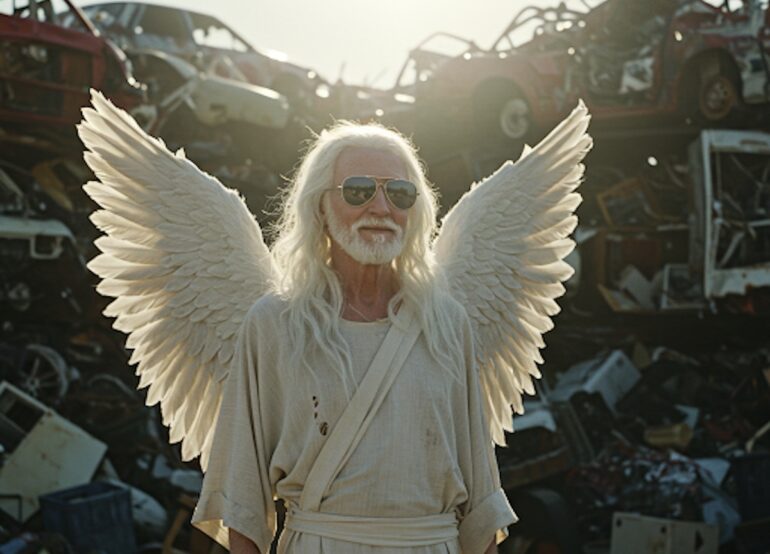Do angels wear sunglasses? The answer is yes, of course. But that’s not really the point of this blog post, sorry. But wait…hmmm…you know, actually, maybe it is. I’ll get to that in a minute.
See, the question I really want to ask you is this: have you ever wondered what inspires my devotions?
The obvious answer is Scripture itself. Each series I write, even when I call them “road trips,” is based on themes or events in the Bible.
But that’s true of almost anyone who writes a devotional series. So a better question is, what has pushed me to write Junkyard Wisdom™ devotions?
Well, I don’t write them to get the theology correct. You’ll definitely find theological contradictions in my devotions, and that’s fine, because you can’t really throw a stone without hitting a religious institution with a different theology than your own. Contradictions are part of what makes us think.
My point is, theology is important, but that’s not what my devotions are about.
I do write my devotions because I love telling stories that might have happened, or could have happened, but probably didn’t happen—yet in a context of truth. Thus I’m drawn to stories about what Jesus might be doing in the world. Those kinds of stories are unexpected because Jesus is unexpected. Trying to put him in a safe little box—like a lot of churches and books try to do, unfortunately—is like trying to keep a junkyard kid from staying out of mischief.
I also love telling stories that include unexpected (and possibly controversial) details. So my devotions are loaded with slight irreverence, my favorite being when the angel tells Mary she’s pregnant, and Mary mutters, “That’s not how mom said it would happen.”
The devotions include silly humor, like Jesus and the disciples having a deep theological discussion while licking ice cream cones.
And they value storytelling over accuracy. In my recent Easter series, Jesus rides his childhood donkey, Sully, on Palm Sunday. Yet the Bible says he rode a colt. I’d say “oops,” but honestly don’t think it matters for these devotions, and riding Sully is a way better story.
You might wonder why I don’t just write normal devotions about Scripture without all the extra “junkyard stuff” added in.
Because that would be boring, and since I’d have nothing of interest to say, I wouldn’t write anything at all. When we see familiar stories in a fresh way—even if it’s through a silly, made-up detail, like an angel wearing sunglasses—we can change, or be changed.
A lot of writers have inspired me. But if I want to point to a style of storytelling that has influenced me, it’s from authors who are way outside the Christian mainstream of thinking. Two examples are Roland Merullo and Christopher Moore. Merullo’s Golfing With God and Moore’s Lamb: The Gospel According to Biff, Christ’s Childhood Pal are wildly creative. If thinking outside the religious box freaks you out, don’t read them—there’s a good chance they’ll mess with your current theology!
For me at least, the danger of being stuck in a religious bubble feels greater than the risk of making a mistake by imagining something different. Creativity, even about the most sacred, most consequential things, can provide a useful friction. It can force us to go beyond simplistic lessons or the platitudes of groupthink.
And what I’ve found most surprising is that when I tell the stories, I’m forced to circle back to the simple Bible stories of my childhood. Like a child, I start wondering about the details not included in Scripture.
Take the Christmas story, for instance. What would a 5-year old think? The donkey must’ve had a name. Someone gave Joseph a map to Bethlehem. Baby Jesus pooped, yet was perfect. And everyone involved loved ice cream, right?
Those aren’t verifiable, theologically tested facts, but they’re true. And truth can be simple, but it’s never simplistic.
Like the human characters on every page of Scripture, if we attempt to follow Jesus, we’re signing up for a life that’s overflowing with messy questions. We’re called to act justly and to prioritize mercy—and at the same time to remember that none of this is up to us.
So how the hell are we supposed to understand that, let alone do all that? How can we live as God’s beloved children while we’re simultaneously head-scratchingly, forehead-bashingly human?
Answering that question, or at least wrestling with it, is what inspires my devotions.
Image created by Gemini. The AI version, not the Greek mythology version, though I do wonder if the Greek gods wore sunglasses.

